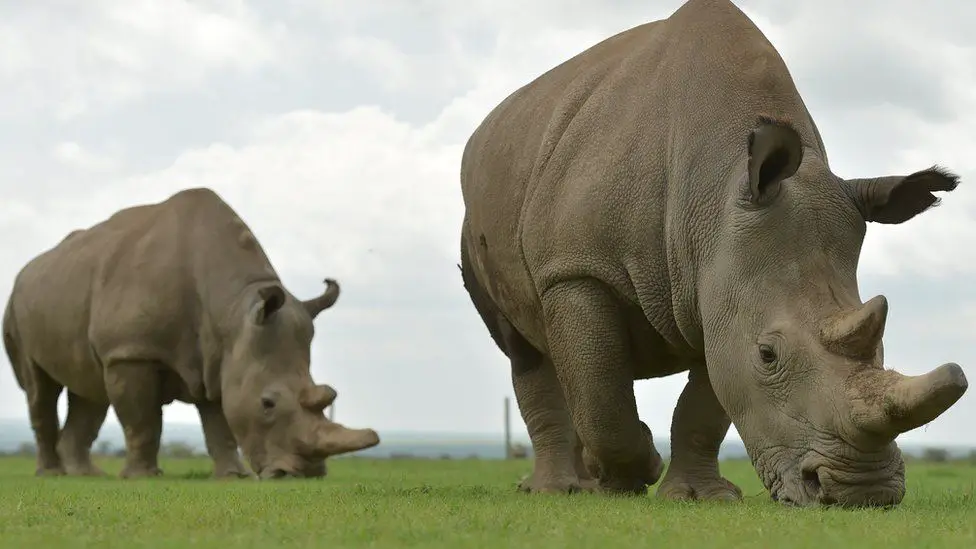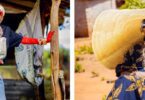Only one of the two last northern white rhinos currently at Ol Pejeta Conservancy is not in good health.
This is according to the conservancy which has hosted both the last species of the northern white male and female rhinos for more than a decade.
Najin and Fatu, the last two female northern white rhinos live in Ol Pejeta. Najin, 31 years old, is said to be of ill health.
Ol Pejeta announced news of her ill health at a time the world is making frantic efforts to save the species now under extinction.
Najin has a tumour on her abdomen which has affected the working of her reproductive organs.
The conservancy has successfully had created two embryos from eggs harvested from Fatu who was given birth to by Najin.
Also read: Experience Kenya’s Wild Safari Excellence At The Ol Pejeta Conservancy
The collection of the embryos happened on December 13, 2020. A multi-agency team drawn from Leibniz Institute for Zoo and Wildlife Research (Leibniz-IZW), Safari Park Dv?r Králové, Kenya Wildlife Service and Ol Pejeta Conservancy was involved in the exercise.
Avantea Laboratory in Italy fertilized the eggs with semen harvested from Sudan, a northern male white rhino that died in 2018. Sudan had been living in Ol Pejeta.
There are now five useful northern white rhino embryos which have been collected and preserved. Three others were created in 2019.
Ol Pejeta Conservancy CEO Richard Vigne offered that the scientific process to produce the embryos gives hope to the world of saving the northern white rhino from extinction.
“The creation of two more embryos nourishes the hope that despite challenges and delays caused by Covid-19, the northern white rhino can still be saved. The next steps in the programme are already underway,” Vigne in a statement.
With Najin’s ill health, the conservancy feels at a loss in knowing that should things get worse, only Fatu will be left to continue the lineage of her species which is endangered.
In 2020, efforts by scientists and researchers to collect eggs from Fatu for harvesting was challenged by the outbreak of coronavirus, a fact that Ol Pejeta acknowledges.
Scientists have been working hard in collecting and fertilizing eggs for embryo production.
“The successful embryo creation in December 2020 is a conciliatory end to a challenging year for the northern white rhino rescue programme and the world of conservation at large. The procedures scheduled for March and June had to be cancelled or postponed owing to the Covid-19 pandemic,” said the conservancy.
However, the egg harvesting process and fertilization has its own fair share of challenges.
In August 2020, Ol Pejeta spoke of a failed bid to create embryos from Fatu and Najin from whom the eggs had been harvested.
Also read:Beautiful Places In Kenya Only Known To A Few But Are Magical
The nine-month span of embryo creation according to scientists affected the outcome.
They later said that with successful embryo creation in December, they discovered that regular embryo creation cycles of between three to four months yielded results.
When Sudan was alive, Najin and Fatu failed to reproduce. Before Sudan’s death in 2018, scientists harvested his semen and that of another northern male white rhino which had died in 2014.
The semen was used in the artificial reproductive technique to enable both Fatu and Najin breed. When their eggs were successfully harvested, they were sent to Italy to the labs.
Vigne added that artificial reproductive technique is the only hope as Najin’s poor health could make the situation worse.
Fatu has proved to be viable in reproduction having 14 eggs harvested from her last year by scientists who flew into Ol Pejeta from Europe.
Kenya’s Tourism Cabinet Secretary Najib Balala in the past hailed efforts by scientists to harvest eggs for reproduction from the world’s last two northern white rhinos.
Balala termed the assisted reproduction “encouraging” calling on the world to stop poaching of rhinos for their horns.








